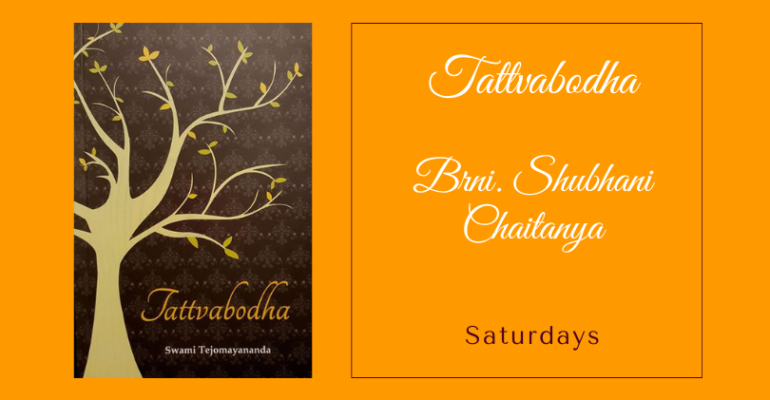Podcast on Spotify
I. Prārabdha Karma
प्रारब्धं कर्म किमिति चेत् ।
इदं शरीरमुत्पाद्य इह लोके एवं सुखदुःखादिप्रदं यत्कर्म
तत्प्रारब्धं
भोगेन नष्टं भवति प्रारब्धकर्मणां भोगादेव क्षय इति ।
prārabdhaṃ karma kimiti cet .
idaṃ śarīramutpādya iha loke evaṃ sukhaduḥkhādipradaṃ yatkarma
tatprārabdhaṃ
bhogena naṣṭaṃ bhavati prārabdhakarmaṇāṃ bhogādeva kṣaya iti .
Translation
Having given birth to this body, the actions which give result in this very world, in the form of happiness or misery and which can be destroyed only by enjoying or suffering them is called prārabdha karma.
Explanation
- Birth, lifespan and enjoyments are determined by prārabdha karma.
- There are different levels of prārabdha karma: Light, medium and heavy.
- E.g. let’s say someone has a sickness. If the prārabdha is light, the sickness will pass through soon. Conversely, if the prārabdha is heavy, they may have to put in a lot of effort to become healthy.
- There are some things we cannot change: our families, siblings etc. But what we can change is our attitude towards them. Everyone in this world has their own challenges. Dealing with challenges and growing with them is far better than denying them.
- This approach comes across in the Serenity Prayer:
God grant me the serenity
To accept the things I cannot change;
Courage to change the things I can;
And wisdom to know the difference.
II. Does karma affect a realized person?
सञ्चितं कर्म ब्रह्मैवाहमिति निश्चयात्मकज्ञानेन नश्यति ।
sañcitaṃ karma brahmaivāhamiti niścayātmakajñānena naśyati .
Translation
Sañcita or accumulated karma is destroyed by the firm knowledge, ‘I am Brahman’ alone.
आगामि कर्म अपि ज्ञानेन नश्यति किंच आगामि कर्मणां
नलिनीदलगतजलवत् ज्ञानिनां सम्बन्धो नास्ति ।
āgāmi karma api jñānena naśyati kiṃca āgāmi karmaṇāṃ
nalinīdalagatajalavat jñānināṃ sambandho nāsti .
Translation
The āgāmi or future karma is also destroyed by knowledge and the wise man is not affected by it-as a lotus leaf is not affected by the water on it.
Explanation
- The notion that “I am this body, mind, intellect” is called the ego or the doer. In reality, we are not the ego. We are pure Consciousness.
- For someone who has realized “I am pure Consciousness”, doership goes away. Past, present and future karma also goes away. The realized being becomes free from the law of karma because karma depends on the kartā (doer) and since doership is destroyed, karma is also destroyed.
- The Witness of waking, dreaming and deep sleep is that very same Consciousness. The waker is negated in the dream and deep sleep state, the dreamer is negated in the waking and sleep state, and so on. The law of karma is only applicable to the ego in the waking state. It is never applicable to the I, the pure Consciousness.
- The realized person will not return to this world after their gross body drops, since there is no more desire for the jīva to come back to this world.
III. What happens to the karma of a realized person?
किंच ये ज्ञानिनं स्तुवन्ति भजन्ति अर्चयन्ति तान्प्रति
ज्ञानिकृतं आगामि पुण्यं गच्छति ।
ये ज्ञानिनं निन्दन्ति द्विषन्ति दुःखप्रदानं कुर्वन्ति तान्प्रति
ज्ञानिकृतं सर्वमागामि क्रियमाणं यदवाच्यं कर्म
पापात्मकं तद्गच्छति ।
सुहृदः पुण्यकृतं दुर्हृदः पापकृत्यं गृह्णन्ति इति।
kiṃca ye jñāninaṃ stuvanti bhajanti arcayanti tānprati
jñānikṛtaṃ āgāmi puṇyaṃ gacchati .
ye jñāninaṃ nindanti dviṣanti duḥkhapradānaṃ kurvanti tānprati
jñānikṛtaṃ sarvamāgāmi kriyamāṇaṃ yadavācyaṃ karma
pāpātmakaṃ tadgacchati .
suhṛdaḥ puṇyakṛtaṃ durhṛdaḥ pāpakṛtyaṃ gṛhṇanti iti.
Translation
Further, to those who praise, serve and worship the wise man, go the results of the actions done by the wise man. To those who criticize, hate or cause pain to the wise man go the results of all un-praiseworthy and sinful actions done by the wise man.
IV. Conclusion
तथा चात्मवित्संसारं तीर्त्वा ब्रह्मानन्दमिहैव प्राप्नोति ।
तरति शोकमात्मवित् इति श्रुतेः ।
तनुं त्यजतु वा काश्यां श्वपचस्य गृहेऽथ वा ।
ज्ञानसम्प्राप्तिसमये मुक्ताऽसौ विगताशयः । इति स्मृतेश्च ।
tathā cātmavitsaṃsāraṃ tīrtvā brahmānandamihaiva prāpnoti .
tarati śokamātmavit iti śruteḥ .
tanuṃ tyajatu vā kāśyāṃ śvapacasya gṛhe’tha vā .
jñānasamprāptisamaye muktā’sau vigatāśayaḥ . iti smṛteśca .
Translation
Thus the knower of the self, having crossed saṃsāra, attains supreme bliss here itself. The śruti affirms-the knower of the self goes beyond all sorrow. Let the wise man cast off his body in Kāśī or in the house of a dog-eater because at the time of gaining knowledge, he is liberated, being freed from all the results of his actions. So assert the smṛtis too.
Explanation
- The realized being is already freed having gained knowledge. They are living without any want or cravings. They are indifferent to the death of the body.
- They are absolutely fearless, fulfilled and at peace and therefore it doesn’t matter where the body drops. In this very life itself, they have already gone beyond the body.
इति स्मृतेश्च ।इति श्रीशङ्करभगवत्पादाचार्यप्रणीतः तत्त्वबोधप्रकरणं समाप्तम् ।
iti śrīśaṅkarabhagavatpādācāryapraṇītaḥ tattvabodhaprakaraṇaṃ samāptam .
Translation
This is the conclusion of the text known as Tattvabodha, composed by Ācārya Śrī Śaṅkara Bhagavatpāda.

